Key takeaways
- The Republican Party in Louisiana has evolved from a focus on fiscal conservatism to a significant emphasis on social issues and populism over recent decades.
- Key influential figures, such as Huey Long and David Vitter, have shaped the party’s identity and its approach to governance in the state.
- Future directions for Louisiana Republicans may require enhancing community engagement, diversifying leadership, and prioritizing education and healthcare to remain relevant.
- The intertwined nature of Louisiana’s culture and politics influences voter mobilization and engagement across different demographics.

Overview of Louisiana Politics
Louisiana politics has always been a vibrant and complex landscape. The rich cultural tapestry of the state—blending Cajun, Creole, and various other influences—makes political affiliations deeply rooted in both identity and tradition. Growing up in Louisiana, I became acutely aware of how local issues often transcend party lines, igniting passionate debates that can divide as much as they unite.
Key aspects of Louisiana politics include:
- Historical Influences: The legacy of populism and strong local leaders has shaped party dynamics.
- Diverse Constituencies: Urban areas like New Orleans often lean more Democratic, while rural towns traditionally support Republican ideals.
- Cultural Impact: Events like Mardi Gras and local festivals reflect the intertwined nature of politics with Louisiana’s vibrant culture.
- Evolving Issues: Matters such as coastal erosion and education reform frequently draw bipartisan concern, showcasing the state’s unique challenges.
- Voter Mobilization: The importance of grassroots movements, especially in recent elections, cannot be overstated; I recall local initiatives that sparked my interest in civic engagement.
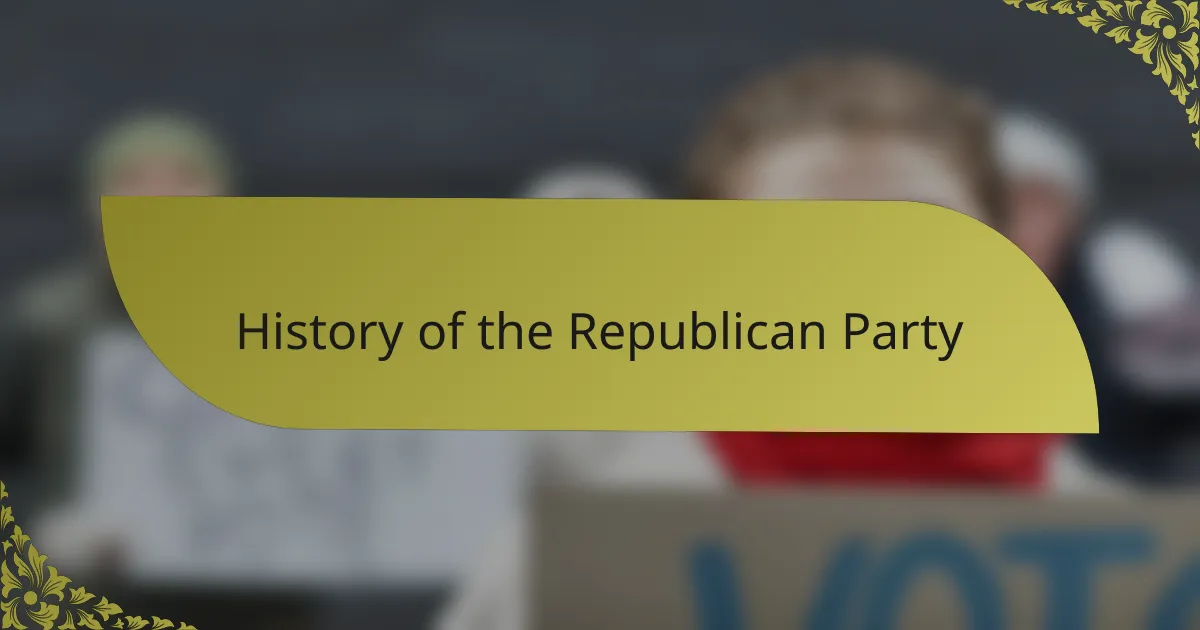
History of the Republican Party
The Republican Party’s roots in Louisiana trace back to the post-Civil War era, when it emerged primarily as a party of reconstruction and civil rights. Initially, it attracted many African American voters who sought representation and progress, a stark contrast to the Democratic Party that predominantly supported segregation. This early alignment resonates with me, as I often ponder the complexities of identity politics and how they’ve evolved over generations.
As the decades rolled on, the Republican Party faced significant shifts, particularly during the mid-20th century. The civil rights movement and the rise of conservatism saw the party gaining traction in Louisiana, especially among white voters disillusioned by the Democrats’ policies. I can’t help but reflect on how this transformation created a landscape where socio-economic issues became tightly intertwined with racial and cultural identities, leading to a political realignment that still influences us today.
By the late 20th century, the Republican Party had established itself as a formidable force in Louisiana politics, winning key statewide offices and legislative seats. I remember attending local Republican rallies and feeling the palpable energy of a community rallying behind candidates who promised change and economic growth. It’s fascinating how those moments, filled with hope and a touch of nostalgia, helped shape my understanding of political engagement in our state.
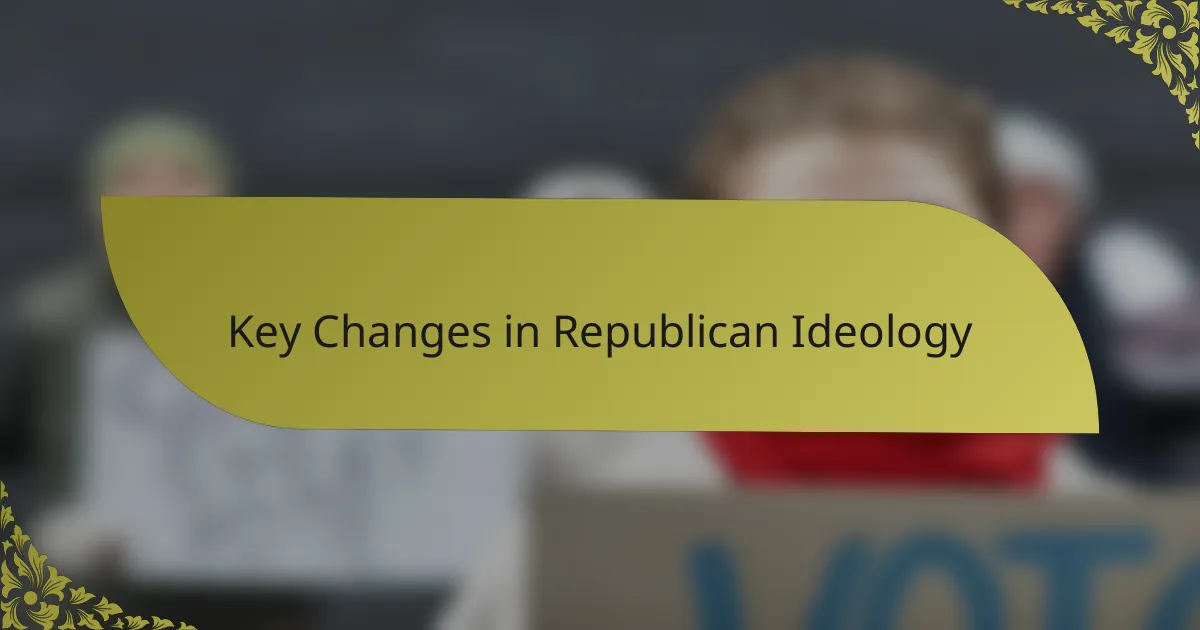
Key Changes in Republican Ideology
The evolution of the Republican Party in Louisiana has marked a significant shift in its ideology over the decades. Initially, the party emphasized fiscal conservatism and limited government, which resonated well with many Louisianans. However, as time has passed, I’ve noticed an increasing focus on social issues, particularly in aligning with more populist sentiments.
Reflecting on my experiences, I remember how discussions around local policies were once rooted in economic matters, but now they often veer into cultural debates. This shift seems to mirror a broader national trend and has changed the way many individuals, myself included, engage with the political landscape.
Here’s a comparison of key ideological frameworks from different eras within the Republican Party in Louisiana:
| Era | Key Ideology |
|---|---|
| Pre-2000s | Fiscal Conservatism, Limited Government |
| 2000s-Present | Social Conservatism, Populism, and Cultural Issues |
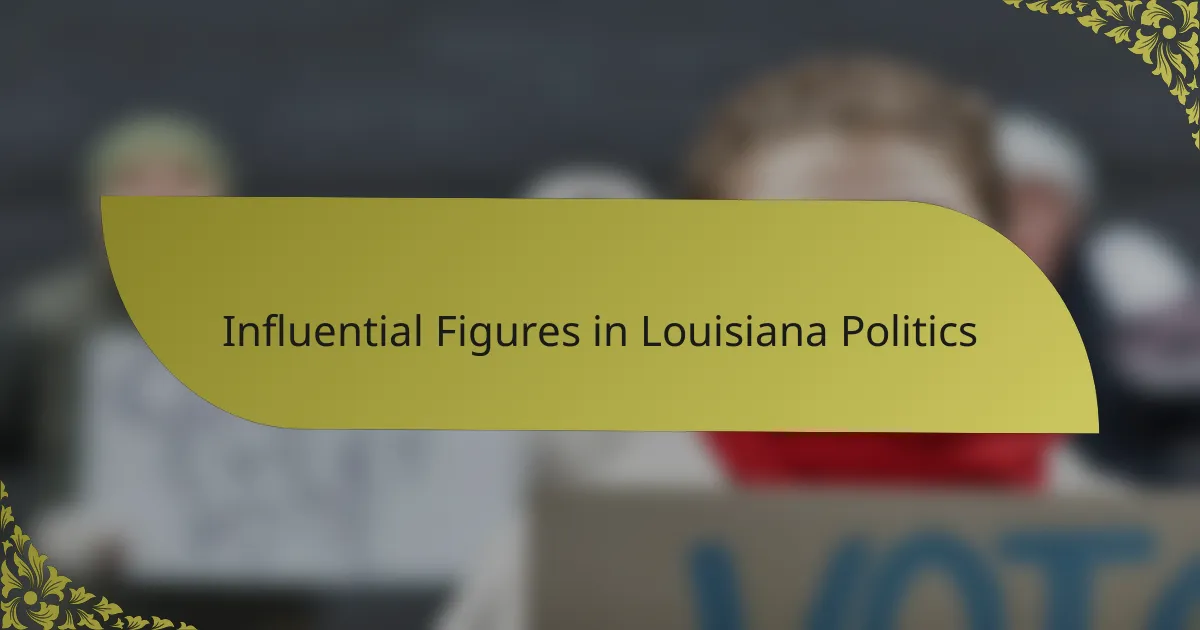
Influential Figures in Louisiana Politics
Throughout Louisiana’s political history, several figures stand out for their influence and contributions. Take, for example, Huey Long, a powerhouse in Louisiana politics during the 1930s. His charisma and populist ideas captivated many, and even today, I find myself in conversations reflecting on how his legacy continues to shape Louisiana’s political landscape.
Another key figure is David Vitter, who served as a U.S. Senator from 2005 to 2017. Vitter’s strong stance on conservative issues resonated with many Louisiana voters, and I recall the fervor at campaign events as he advocated for family values and economic growth. It’s intriguing how politicians like him have left an indelible mark on the Republican Party’s identity in our state.
More recently, figures like Governor Bobby Jindal introduced significant reforms that sparked debate among citizens, especially regarding education and healthcare. I remember the heated community discussions surrounding his policies; they revealed how deeply people care about the direction of Louisiana’s future. These influential leaders remind us of the powerful role individuals play in shaping not just party ideologies, but the very fabric of our state’s governance.
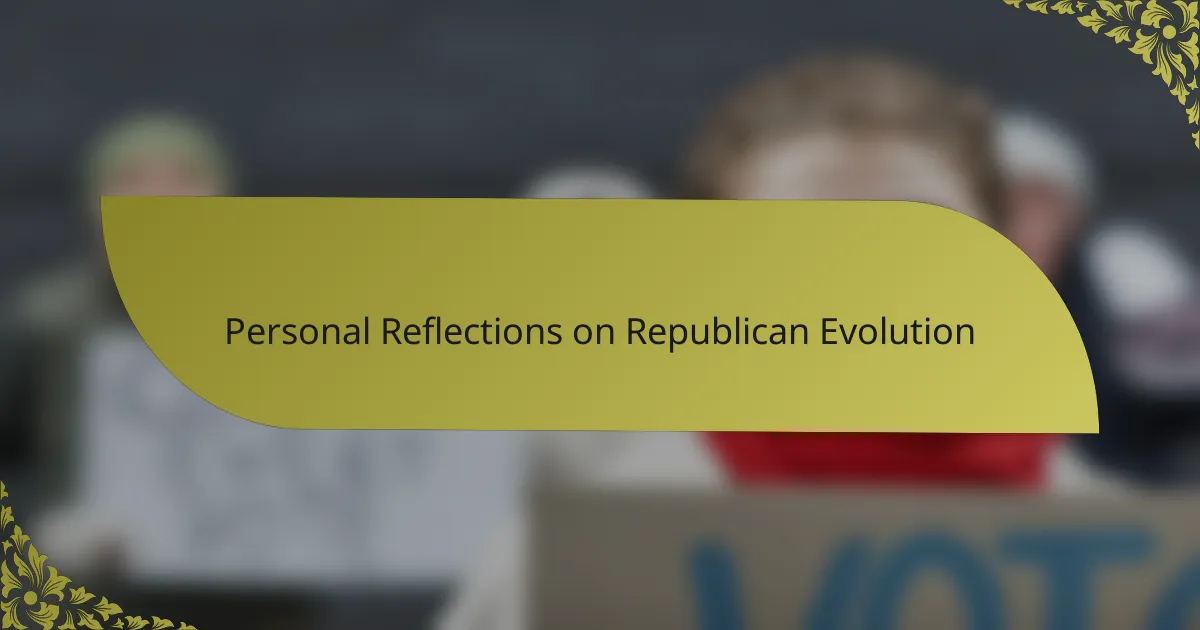
Personal Reflections on Republican Evolution
Reflecting on the evolution of the Republican Party in Louisiana, I can’t help but think about how personal my journey has been within this political landscape. Growing up, my family was deeply rooted in conservative values, and I remember lively dinner table discussions about the direction of our party. It’s fascinating to see how those values have transformed over the years, shaping not just the party but also the broader cultural identity of Louisiana.
One significant observation I’ve made is how the focus has shifted from traditional conservative issues like fiscal responsibility to more contentious topics such as social policies and immigration. It brings a mix of nostalgia and frustration; I miss the times when the emphasis was on pragmatic governance rather than divisive rhetoric.
- Shift towards more socially conservative values over the past two decades.
- Increased influence of grassroots movements within the party, reflecting local priorities.
- The rise of a more populist approach, distancing from establishment politics.
- A growing emphasis on environmental policies, such as coastal restoration, reflecting Louisiana’s unique challenges.
- Personal experiences of witnessing candidates who resonate with both old guard Republicans and a younger, more diverse voter base.
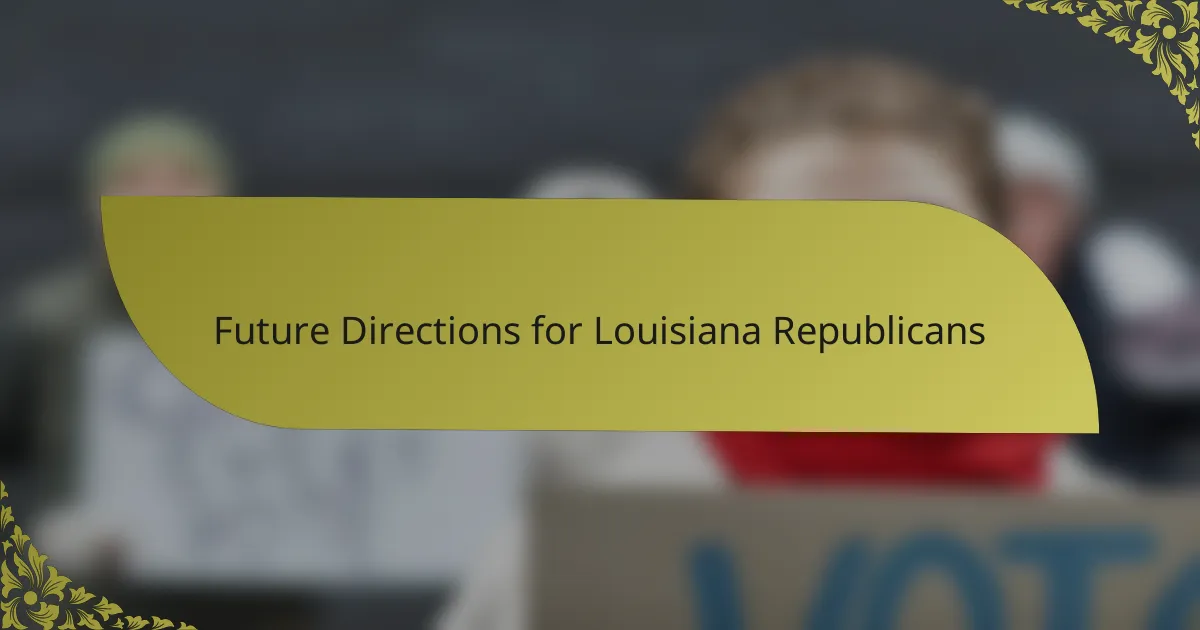
Future Directions for Louisiana Republicans
As I observe the landscape of Louisiana politics, I can’t help but feel that the future directions for Louisiana Republicans hinge on their ability to adapt to the changing demographics and values of the state. I remember attending a local town hall meeting where constituents voiced their desire for more focus on education and healthcare. This experience highlighted for me the need for the party to shift its platform towards addressing these pressing social issues if they wish to remain relevant.
Looking ahead, Republicans may want to consider the following strategies:
- Enhancing Community Engagement: Building stronger ties with local communities through outreach efforts can help rebuild trust and support among voters.
- Diversifying Leadership: Introducing a more diverse slate of candidates can reflect the state’s changing demographics and attract new supporters.
- Focusing on Key Issues: Prioritizing education, healthcare, and economic development could resonate well with both potential and existing constituents.
- Promoting Conservation: Advocating for environmental protection laws can align with Louisiana’s unique ecosystem and show a commitment to sustainable practices.
- Emphasizing Moderate Policies: Positioning the party as one that seeks common ground may attract independent and moderate voters who feel unheard in today’s polarized environment.
These steps could not only rejuvenate the party’s image but also create a more inclusive and responsive political environment in Louisiana.